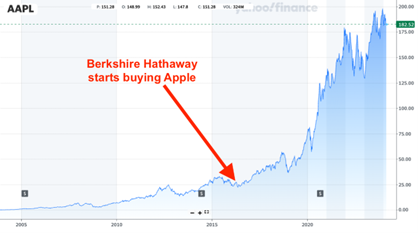Warren Buffett’s new annual letter to Berkshire Hathaway (BRK.A) shareholders opened with a thoughtful tribute to Charlie Munger, his long-time partner who died in November. He highlighted the huge impact Munger had on how he thought about investing – including the “cigar butt” theory, writes Sam Ro, editor of TKer.
From the letter:
“Charlie, in 1965, promptly advised me: ‘Warren, forget about ever buying another company like Berkshire. But now that you control Berkshire, add to it wonderful businesses purchased at fair prices and give up buying fair businesses at wonderful prices. In other words, abandon everything you learned from your hero, Ben Graham. It works but only when practiced at small scale.’ With much back-sliding I subsequently followed his instructions.”
In case you aren’t familiar, Ben Graham wrote the finance classic The Intelligent Investor. Also known as the “father of value investing,” Graham was Buffett’s professor at Columbia Business School and later his boss.
Under Graham’s guidance, Buffett mastered the idea of “buying fair businesses at wonderful prices,” or stocks trading at less than their intrinsic value. One colorful iteration of this is “cigar butt” investing. Buffett explained in his 1989 letter to Berkshire shareholders:
“If you buy a stock at a sufficiently low price, there will usually be some hiccup in the fortunes of the business that gives you a chance to unload at a decent profit, even though the long-term performance of the business may be terrible. I call this the ‘cigar butt’ approach to investing. A cigar butt found on the street that has only one puff left in it may not offer much of a smoke, but the ‘bargain purchase’ will make that puff all profit.”
Buffett had a lot of success with this approach. However, the issue with “cigar butt” investing is that there aren’t many opportunities, and the opportunities tend to be small.
Munger’s suggestion to flip the script and add “wonderful businesses purchased at fair prices” expanded the range of opportunities that Berkshire could pursue for its growing portfolio. It’s this kind of thinking that justified Berkshire amassing shares of Apple (AAPL) starting in 2016 at a time when many questioned how much further the stock could run.

Source: Yahoo Finance
Great trades are rarely simple analytical exercises where outcomes match expectations. They often challenge your instincts, and they require that you balance humility and discipline with a willingness to change your mind.
While it’s hard enough to sell a stock that’s created a ton of wealth for you, it’s a whole other thing to step away from a working investment strategy you’ve been mastering for your entire career. But this is what Munger urged Buffett to do, and the change has so far been a winning move for Berkshire and its shareholders.
I’d argue Buffett’s greatest trade didn’t involve any single financial security. Rather, I’d say his greatest trade was selling “cigar butt” investing and buying the investing philosophy championed by his right-hand man. Credit to Munger for making the recommendation. Credit to Buffett for executing the trade.










